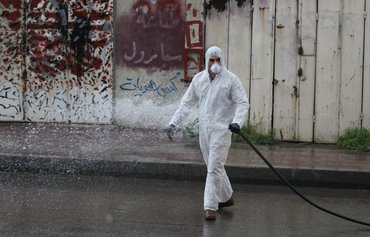Iraqis have lauded the decision of their government to close the border with Iran where cases of novel coronavirus (COVID-19) infections and deaths have reached dangerous levels.
Iraq first shut its 1,500-kilometre border with Iran in mid-March and deployed troops to enforce the decision.
On Sunday (March 22nd), Iraq imposed a total nationwide lockdown until March 28th to fight the virus.
Most Iraqi provinces had imposed local curfews, but the new measures include the whole country, according to a new decision by the government's crisis cell.
![A health guide explains to Iraqis on March 13th how the novel coronavirus is transmitted and preventive measures that are taken to stem its spread. [Photo courtesy of the Iraqi Ministry of Health]](/cnmi_di/images/2020/03/25/23045-iraq-market-covid-600_384.jpg)
A health guide explains to Iraqis on March 13th how the novel coronavirus is transmitted and preventive measures that are taken to stem its spread. [Photo courtesy of the Iraqi Ministry of Health]
Schools, universities and other gathering places will remain closed, as will the country's multiple international airports, it said.
Iraq has registered 316 cases of the virus and 27 associated deaths to date.
Militias attempt to keep border open
Iraqi militias aligned with Iran should not be permitted to pressure the government to renege on its decision to close the border, citizens told Diyaruna, or delay the implementation of precautionary measures that would help stem the spread of COVID-19.
"The virus has spread throughout Iran and the threat it poses [to Iraq] is catastrophic if the border stays open," said Ali Raji, a resident of Baghdad.
"Militia members do not care about our lives [...] They spread death throughout our country to appease Iran and prevent its economic interests from being affected as a result of the border closure," another Baghdad resident, who preferred to stay anonymous, told Diyaruna.
He stressed the importance of preventing the Iran-backed militias from influencing the government's decisions and to confront their pressure tactics to keep the borders open and to resume travel and trade between the two countries.
"The militias do not care about the fate of the Iraqi people and only want to serve the Iranian agenda and protect their interests and influence," political analyst Ghanim al-Abed said.
"These groups are responsible for taking many innocent lives, inciting violence and committing countless crimes and massacres," he told Diyaruna.
"I do not expect them to be interested in protecting Iraqis and the country from the coronavirus," he added.
Al-Abed said five border crossings with Iran have been closed, but he cautioned that the militias still control the various unofficial crossings that remain functional between the two countries.
The militias are challenging all government decisions and measures related to confronting the coronavirus, he said.
He noted that members of Saraya al-Salam, which is linked to influential cleric Muqtada al-Sadr, allowed a bus carrying Iranian passengers to enter the city of Samarra on March 7th to visit holy sites in violation of government instructions.
Militias also are exerting pressure on the government to keep flights to and from Iran running as usual, he added.
This has prompted angry protestors to gather at an airport in central Iraq's Najaf on March 14th to demand that the airport be shut down, according to al-Abed.
Iraqis unhappy with Iranian meddling
Al-Abed said Iraqis are already suffering from the meddling of the Iranian regime in their affairs and its efforts to destabilise the security and political situation.
They do not need the regime and its agents to add to their suffering in a way that could threaten their lives, he added.
"Right from the beginning, Iranian leaders have hidden facts related to the number of infected people and deaths in their country and the number of cases has been alarmingly on the rise," said political analyst and researcher Abdul Qader al-Nayel.
"They have not taken any serious measures to contain the virus and mitigate its spread, nor did they close their borders," he told Diyaruna.
"Due to the policies of its arrogant leaders and their disregard for the lives of their own citizens, Iran has become an epicentre of the pandemic, and yet, they are still determined to lie and deceive," al-Nayel said.
Secretary General of the Iranian Supreme Council, Ali Shamkhani, during a recent visit to Iraq, stressed Tehran's willingness to assist the Iraqi government in fighting the virus.
These statements elicited widespread criticism inside Iran, al-Nayel said, but also among Iraqis, who wondered "how the Iranian regime can help them when it has failed to manage its own crisis".
US Secretary of State Mike Pompeo slammed Iran's Supreme Leader Ali Khamenei on Monday (March 23rd), saying his "lies" were putting the world at greater risk.
"The regime continues to lie to the Iranian people and the world about the number of cases and deaths, which are unfortunately far higher than the regime admits," Pompeo said.

![An employee at the Baghdad International Airport testing travelers for the novel coronavirus on March 1st. [Photo via the Baghdad International Airport website]](/cnmi_di/images/2020/03/25/23044-Baghdad-Airport-Coronavirus-600_384.jpg)






